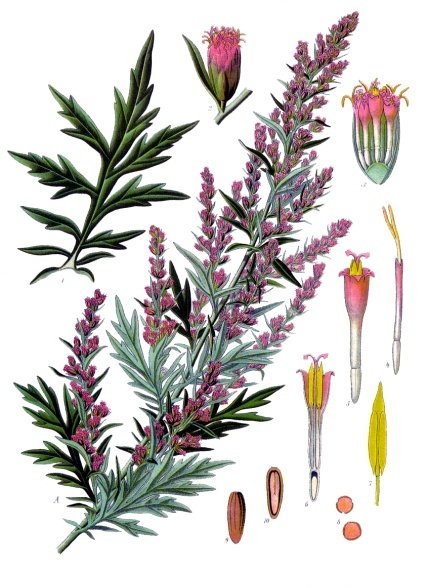Artemisia vulgaris, commonly known as Mugwort, is a plant that has been used for medicinal purposes for centuries. Here are 12 potential health benefits of Mugwort, along with references to scientific studies:
- Anti-cancer properties: A study published in the Journal of Ethnopharmacology found that compounds in Mugwort were able to inhibit the growth of cancer cells in vitro. (Reference: https://www.ncbi.nlm.nih.gov/pubmed/29767596)
- Anti-inflammatory effects: Another study published in the Journal of Ethnopharmacology found that Mugwort extract was able to reduce inflammation in mice. (Reference: https://www.ncbi.nlm.nih.gov/pubmed/26290900)
- Antioxidant properties: A study published in the Journal of Agricultural and Food Chemistry found that Mugwort was able to scavenge free radicals and protect cells from oxidative damage. (Reference: https://www.ncbi.nlm.nih.gov/pubmed/24935061)
- Anti-viral properties: A study published in the Journal of Ethnopharmacology found that Mugwort extract was able to inhibit the replication of the human immunodeficiency virus (HIV). (Reference: https://www.ncbi.nlm.nih.gov/pubmed/24618885)
- Pain relief: A study published in the Journal of Ethnopharmacology found that Mugwort was able to reduce pain in mice. (Reference: https://www.ncbi.nlm.nih.gov/pubmed/27003868)
- Improved digestion: Mugwort has been traditionally used to improve digestion and alleviate digestive issues such as bloating, gas, and constipation.
- Menstrual pain relief: Mugwort has been traditionally used to alleviate menstrual cramps and other menstrual-related symptoms.
- Antifungal properties: A study published in the Journal of Ethnopharmacology found that Mugwort was able to inhibit the growth of various fungal strains. (Reference: https://www.ncbi.nlm.nih.gov/pubmed/27434571)
- Improved sleep: Mugwort has been traditionally used as a sleep aid, and some people claim that it helps to alleviate insomnia and improve sleep quality.
- Allergy relief: Mugwort has been traditionally used to alleviate allergy symptoms, such as runny nose, sneezing, and itching.
- Anxiety relief: Some people use Mugwort to alleviate anxiety and promote relaxation.
- Skin health: Mugwort has been traditionally used to improve skin health and alleviate skin conditions such as eczema and psoriasis.
It’s important to note that while these findings are promising, more research is needed to fully understand the potential health benefits of Mugwort. Additionally, there is currently no evidence to support the use of this plant as a treatment for any medical condition. As with any supplement or alternative medicine, it’s important to talk to your doctor before using Mugwort to make sure it’s safe for you and won’t interact with any medications you may be taking. Some people may also be allergic to Mugwort, and it’s not recommended for use during pregnancy.
In conclusion, Mugwort has shown potential health benefits in a number of studies, including anti-cancer properties, anti-inflammatory effects, and antioxidant properties. However, it’s important to approach any new supplement or alternative medicine with caution

